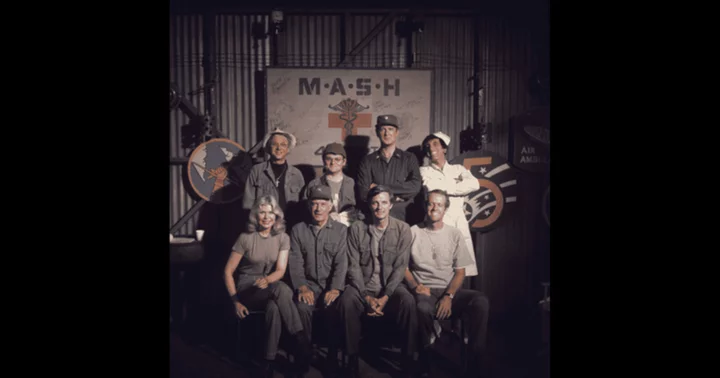LOS ANGELES, CALIFORNIA: On September 17, 1972, the iconic TV comedy series 'M*A*S*H' made its debut on CBS in the United States.
The series, which was set during the Korean War, followed the staff of a Mobile Army Surgical Hospital (M*A*S*H) and blended humor with the harsh realities of war. 'M*A*S*H' was not only a huge success with audiences but also received critical acclaim throughout its run.
'M*A*S*H': A legendary television series with enduring impact
'M*A*S*H' ran for 11 seasons, making it one of the longest-running television series in American history.
The show's final episode, 'Goodbye, Farewell and Amen', which aired on February 28, 1983, became one of the most-watched television episodes in history, with over 105 million viewers.
Throughout its run, "M*A*S*H" garnered numerous awards and accolades, including 14 Emmy Awards and a Peabody Award.
The series remains a beloved classic, known for its sharp wit, memorable characters, and its ability to tackle serious themes while retaining its comedic flavor.
It left a lasting impact on television and popular culture and is still enjoyed by audiences through reruns and streaming platforms.
Derived from Robert Altman's Academy Award-nominated movie from 1970. 'M*A*S*H' made its debut on September 17, 1972.
The show depicted the lively and chaotic existence within a Mobile Army Surgical Hospital located in South Korea, set against the backdrop of the early 1950s Korean War.
50 years of 'M*A*S*H': A brilliant blend of comedy and drama
John Leverence, the Senior Vice President of Awards at the Television Academy, describes 'M*A*S*H' as “a brilliant mash-up of comedy and drama with a wonderful cast and great characters." He notes, “But it also included this emotional detachment from these real-life horrors that was, and still is, part of American culture," according to Parade.com.
While the Korean War lasted only three years, one month, and two days, 'M*A*S*H' ran for an impressive 11 seasons, and its 1983 finale remains the most-watched episode in television history.
Where was the show filmed?
A section of the Fox Ranch, which later became Malibu Creek State Park in California, served as the substitute location for Korea in the show.
In the penultimate episode titled 'As Time Goes By', the characters buried a time capsule there. Interestingly, the cast decided to include one of their own items in the capsule, with the hope that it would be unearthed many years down the line.
Surprisingly, just two months after the episode aired, a construction worker stumbled upon the buried time capsule.
Who did the producers want for the role of Trapper?
Wayne Rogers didn't initially land the part of Capt "Trapper" John McIntyre.
Producers approached comedian Robert Klein, thinking that his established name might boost the show's appeal. However, Klein declined the offer, stating that the role wasn't a good fit for him.
Who composed the theme song for 'M*A*S*H'?
The television series retained the original theme song from the movie for its opening credits.
However, they removed the lyrics from "Suicide Is Painless" and made adjustments to the musical arrangement.
Robert Altman had originally engaged his teenage son Michael to collaborate with composer Johnny Mandel in crafting the lyrics, aiming to infuse a childlike quality into the song's dark subject matter.
This collaboration proved to be quite lucrative for the young Michael, earning him over $1 million in royalties.
Klinger's wedding dresses
Jamie Farr's character, Klinger, was occasionally spotted wearing a wedding dress, such as in the episode where he married Laverne Esposito.
In the series finale, when he got married again, his bride Soon-Lee (played by Rosalind Chao) also wore a wedding dress from his collection. Furthermore, he provided "Hot Lips" with another wedding gown from his collection when she married Lt Col Donald Penobscott (portrayed by Mike Henry).
The best 'M*A*S*H' episodes
'M*A*S*H' treated its audience to a total of 251 clever and heartwarming episodes across its 11-season run, and a few of them continue to be iconic even today. Here are five essential episodes, all of which are available for streaming on Hulu:
1. 'Sometimes You Hear the Bullet' (Season One, Episode 17): While Hawkeye is typically known for his humor, in this episode, the surgeon reveals a more solemn side as he strives to save the life of a close friend. Notably, a young Ron Howard makes an appearance.
2. 'Abyssinia, Henry' (Season Three, Episode 24): This episode not only bid farewell to the honorable Lt Col Henry Blake (played by McLean Stevenson) upon his honorable discharge but also stunned viewers in its final scene by revealing that his plane had been shot down with no survivors.
Among the cast, only Alan Alda was aware of this plot twist. According to Leverence, this episode left viewers with a feeling of abruptly hitting a metaphorical brick wall.
3. 'The Interview' (Season Four, Episode 25): In this black-and-white documentary-style episode, a war correspondent (Clete Roberts) conducts interviews with the members of the 4077 unit, drawing inspiration from journalist Edward R Murrow's interviews with Marines in 1952.
Alda mentioned that much of this episode was improvised, and such unconventional approaches brought a sense of adventure to the cast and crew.
4. 'Point of View' (Season Seven, Episode 11): This episode offers viewers a unique perspective on the wartime experience by narrating the story entirely from the viewpoint of a wounded soldier.
All the scenes were captured in a single take. Alda was drawn to this episode due to its unconventional storytelling, and it received two Emmy nominations.
5. 'Goodbye, Farewell and Amen' (Season 11, Episode 16): This was the grand finale, with over 120 million viewers tuning in to witness the culmination of the series.
Directed and co-written by Alda, the episode sees the end of the war and the dispersion of the staff. Leverence notes that it possessed substantial content and an emotionally charged element, making it an essential episode.

